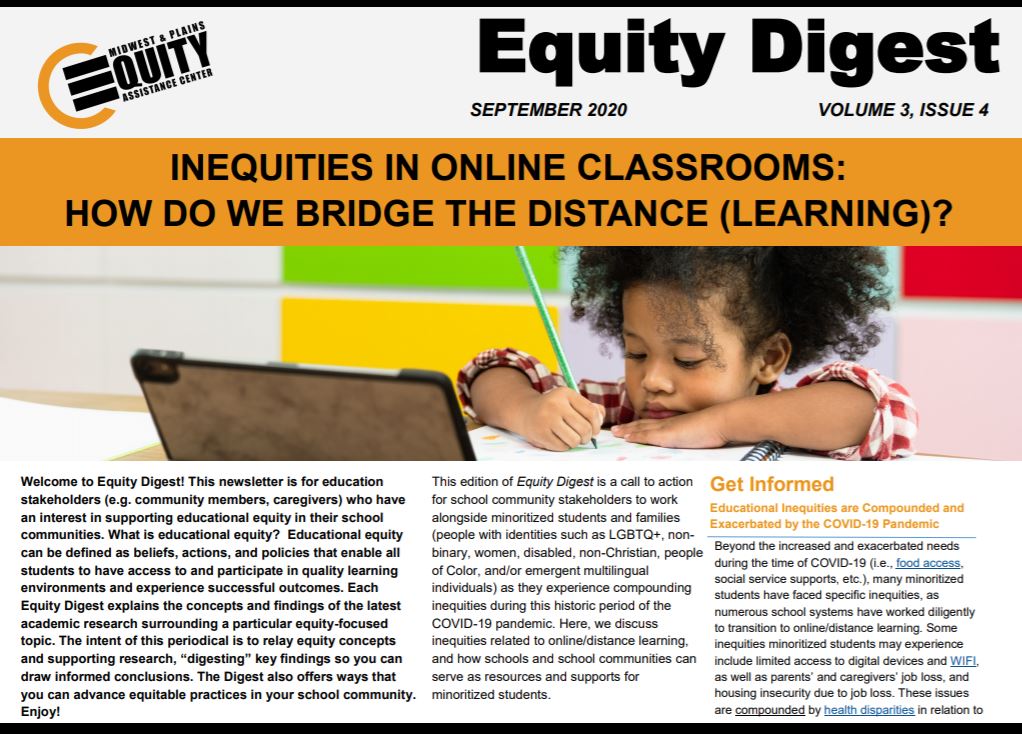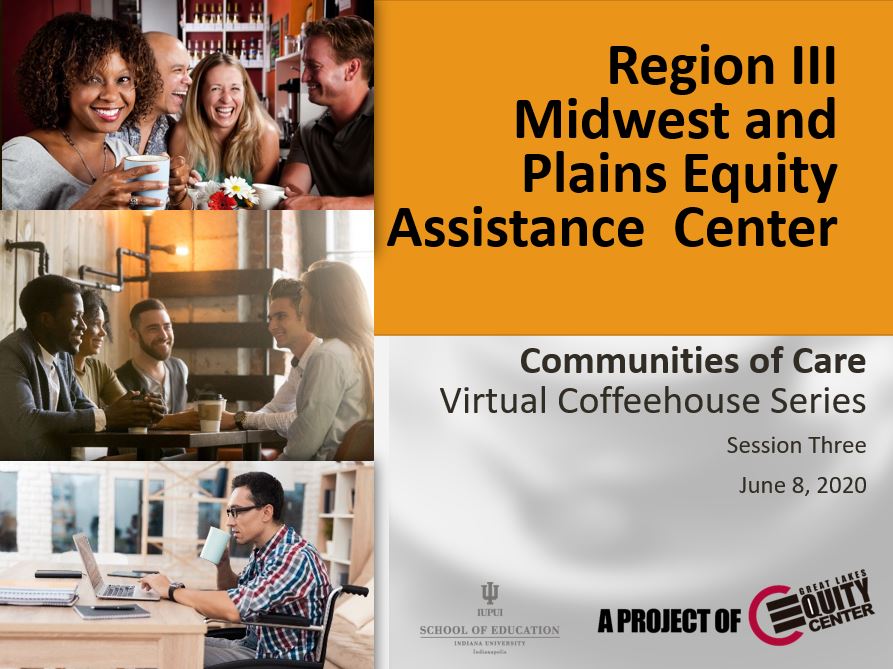Center Statement
 As the COVID-19 outbreak continues to impact our world, communities, and families, the Midwest and Plains Equity Assistance Center remains focused on supporting states, districts, schools, and community partners in collective work to ensure students' civil rights and equitable access to inclusive, affirming, and safe educational experiences. COVID-19 affects us all; thus, we are innovating new ways to support everyone in the school community—students and their families, educators, administrators—all the way to the state level, across our 13-state region.
As the COVID-19 outbreak continues to impact our world, communities, and families, the Midwest and Plains Equity Assistance Center remains focused on supporting states, districts, schools, and community partners in collective work to ensure students' civil rights and equitable access to inclusive, affirming, and safe educational experiences. COVID-19 affects us all; thus, we are innovating new ways to support everyone in the school community—students and their families, educators, administrators—all the way to the state level, across our 13-state region.
Although schools, workplaces, universities, are closing and transitioning to alternative online options, and our office is 100% virtual for the near future, we continue to accept requests for assistance, meet with partners, share resources, and add new content to our website, customized e-forums, and social media platforms. In order to address the drastically different learning conditions during this pandemic, we have formed two new COVID-19 Response Committees—one to address new opportunities and relevant topics for professional learning and one to attend to the shifting needs of our partners during this pandemic. We look forward to serving you in new ways that attend to the specific needs of our partners in their local contexts.
While many of us are in the first weeks of shelter-in-place and stay at home orders, schools and education agencies are planning for extended closures over the next several weeks or throughout the remainder of the semester. The Midwest and Plains Equity Assistance Center is here to support your education agency through these difficult times, as educators grapple with the challenges of providing children with educational opportunities, meals, and other supports and resources. Together, we will emerge stronger on the other side of this global crisis.
This pandemic is enhancing inequities seen in our educational systems and in larger society—access and opportunity are more limited now than ever before. Collectively, we can work together as an education community to ensure that the civil rights of students are protected and all youth, particularly those who are historically marginalized, experience caring, inclusive, safe, and equitable learning opportunities during this pandemic.
Thank you for your dedication to ensuring all students have equitable access to quality learning experiences during this challenging time. We are dedicated to providing the tools and supports you need during this pandemic and into the future.
Equity Considerations for Online & Distance Learning
 As the COVID-19 outbreak continues to impact our world, communities, and families, the Midwest and Plains Equity Assistance Center remains focused on supporting states, districts, schools, and community partners in collective work to ensure students' civil rights and equitable access to inclusive, affirming, and safe educational experiences. COVID-19 affects us all; thus, we are innovating new ways to support everyone in the school community—students and their families, educators, administrators—all the way to the state level, across our 13-state region.
As the COVID-19 outbreak continues to impact our world, communities, and families, the Midwest and Plains Equity Assistance Center remains focused on supporting states, districts, schools, and community partners in collective work to ensure students' civil rights and equitable access to inclusive, affirming, and safe educational experiences. COVID-19 affects us all; thus, we are innovating new ways to support everyone in the school community—students and their families, educators, administrators—all the way to the state level, across our 13-state region.
Although schools, workplaces, universities, are closing and transitioning to alternative online options, and our office is 100% virtual for the near future, we continue to accept requests for assistance, meet with partners, share resources, and add new content to our website, customized e-forums, and social media platforms. In order to address the drastically different learning conditions during this pandemic, we have formed two new COVID-19 Response Committees—one to address new opportunities and relevant topics for professional learning and one to attend to the shifting needs of our partners during this pandemic. We look forward to serving you in new ways that attend to the specific needs of our partners in their local contexts.
While many of us are in the first weeks of shelter-in-place and stay at home orders, schools and education agencies are planning for extended closures over the next several weeks or throughout the remainder of the semester. The Midwest and Plains Equity Assistance Center is here to support your education agency through these difficult times, as educators grapple with the challenges of providing children with educational opportunities, meals, and other supports and resources. Together, we will emerge stronger on the other side of this global crisis.
This pandemic is enhancing inequities seen in our educational systems and in larger society—access and opportunity are more limited now than ever before. Collectively, we can work together as an education community to ensure that the civil rights of students are protected and all youth, particularly those who are historically marginalized, experience caring, inclusive, safe, and equitable learning opportunities during this pandemic.
Thank you for your dedication to ensuring all students have equitable access to quality learning experiences during this challenging time. We are dedicated to providing the tools and supports you need during this pandemic and into the future.
Considerations
-
Students with disabilities face a variety of challenges when attempting to participate in and engage with curriculum online. Educators designing online and distance learning experiences should create content in a way that every student, including those with disabilities is able to access and take full advantage of learning opportunities (Rose, 2014). This includes thinking through color selection to not impact students with color blindness, putting content in PDFs that are searchable, including meaningful graphics with tagged descriptions, text transcriptions with audio accompaniments, videos with synchronized captions, course navigation that does not rely on a mouse, if content is used from external links they meet the same accessibility standards, and review of courses with access of a screen reader in mind (Rose, 2014). Described and Captioned Media Program (DCMP) supports families and educators with free and accessible Remote Learning resources. Families and educators who have at least one student with a disability can register for free membership and access over 8,000 captioned and described educational videos.
-
Educators designing online learning should create virtual learning spaces that are accessible to the widest possible range of students. This includes relying on Universal Design for Learning (UDL) by developing content that moves beyond the most traditional and basic forms of physical engagement and can be acted on in a variety of ways (e.g. auditory, visual, tactile, etc.) (Basham, Stahl, Ortiz, Rice, & Smith, 2015).
-
When creating online or distance learning spaces, educators must consider civil rights issues, especially with regards to access and instructional issues that arise when schools and educators take action without considering impact on students from a particular race, ethnicity, gender, or dis/ability (Rose, 2014). This also includes considering whether English skills will impede their learning within the online space (Rose, 2014). See here for great resources for English Language Learners.
- When moving to online platforms or distance learning, consider whether students will be required to provide their own computer and/or internet connection. If yes, students are potentially being denied equal access to their learning opportunities if the school or district does not have provisions in place to assist students and families (Rose, 2014). Educators should find ways to enable all students, not just those with high-speed internet and computer access at home to be able to engage in learning platforms (Guernsey, Ishmael, & Prescott, 2020). Consider public television broadcasts of learning activities or mobile wi-fi hotspots (with map) in order to ensure more equal access for all students.
- When moving to online or distance learning platforms, the social and emotional well-being of students should be at the highest priority. Structures educators can put in place to address the well-being of students includes, (1) establishing a clearly communicated and maintained routine, (2) prioritizing relationships and well-being over tasks, assignments, and behavioral compliance, (3) continue to find creative ways to keep students connect to school, to learning, to teachers, and to their peers (Teaching Tolerance, 2020). Here is a great resource for parents/caregivers about children’s social-emotional wellbeing during the pandemic.
References
- Basham, J. D., Stahl, S., Ortiz, K., Rice, M. F., & Smith, S. (2015). Equity matters: Digital & online learning for students with disabilities. Lawrence, KS: Center on Online Learning and Students with Disabilities.
- Guernsey, L., Ishmael, K., & Prescott, S. (2020). Online learning in the wake of COVID-19: Tips and resources for preK-12 with equity in mind. Retrieved from https://www.newamerica.org/education-policy/edcentral/online-learning-wake-covid-19/
- Noonoo, S. (2020). Here’s what schools can do for the millions of students without internet access. Retrieved from https://www.edsurge.com/news/2020-03-20-here-s-what-schools-can-do-for-the-millions-of-students-without-internet-access
- Rose, R. (2014). Access and equity for all learners in blended and online education. Retrieved from https://files.eric.ed.gov/fulltext/ED561307.pdf
- Skelton, S. M., & Kyser, T. S. (2016). Leadership practices for advancing educational equity [PowerPoint slides]. Retrieved from https://greatlakesequity.org/resource/leadership-practices-advancing-educational-equity
- Teaching Tolerance. (2020). A trauma-informed approach to teaching through coronavirus. Retrieved from https://www.tolerance.org/magazine/a-trauma-informed-approach-to-teaching-through-coronavirus
Five Big Equity Ideas for Designing Distance Learning Opportunities
Center Resources
|
Inequities in Online Classrooms--How Do We Bridge the Distance (Learning)? In this Equity Digest, we discuss inequities related to online/distance learning, and how schools and school communities can serve as resources and supports for minoritized students. Having these ongoing discussions lend themselves to keeping pace with the growing body of knowledge in relation to COVID-19 and schooling. |
Towards Communities of Care: Facing Death, Dying, & Loss Due to COVID-19 Related Illnesses During this Communities of Care Virtual Coffeehouse, participants discussed supporting students and families negotiating death, dying, and loss, as well as how to approach authentically caring for school communities as an act of teaching and learning. Transcripts available.
|
Disability and English Learners: Intersections of Civil Rights and Best Practice This Equity by Design brief reviews civil rights law, federal disability laws, and related best practices in order to help schools conceptualize nondiscriminatory, effective services to their growing English Learner (also known as English Language Learners or ELL) populations, particularly for students with disabilities, and those students suspected of having disabilities. |
Website Resources A-Z
|
4 aplicaciones educativas que se pueden usar sin conexión a Internet (Educational apps that you can use without an Internet connection) Si su familia tiene acceso limitado a internet o si no tiene banda ancha en casa, Common Sense Media le recomenda algunas aplicaciones educativas y divertidas que sus chicos podrán utilizar sin necesidad de internet. Texts and videos for ELA, Science, and Social Studies with scaffolds and higher-order questions, designed for distance learning. Free for parents/caregivers and educators. African American Policy Forum COVID-19 Resource Lists Links and resources that cover a large array of information, from general support and information to mutual aid support networks, emergency funds, and mental health details. Agency & Young Children Research Collective How to support and educate young children using online technologies for parents/caregivers, educators, administrators (English & Spanish). American Academy of Child and Adolescent Psychiatry AMLE's COVID-19 Resource Center Supporting middle level educators with COVID-19 resources in advisory/SEL, arts, ELA, math, physical education, science, and social studies for remote learning. A website and online community for Black moms with homeschooling activity ideas and resources. Accessible, inclusive learning guides for parents/caregivers and educators. Center for Parent Information and Resources (CPIR) Coronavirus resources for parents/caregivers: homeschooling, current information, multiple languages.
Centers for Disease Control and Prevention (CDC) The most up-to-date information about the COVID-19 pandemic.
Centers for Medicare and Medicaid Services The Centers for Medicare & Medicaid Services, CMS, is part of the Department of Health and Human Services (HHS). Social-emotional information and support for parents/caregivers during the pandemic (English & Spanish).
Choice Board Repository (Jefferson County Public Schools, KY) This choice board repository for parents/caregivers and educators offers different grade level "choice boards" as a way to assess different ways of learning different topics and to make concepts more accessible to different types of learners by providing several manners of learning a concept. A bilingual site for educators and families of emergent multilingual students. Common Sense Media Coronavirus Support Technology and media support for parents/caregivers during the pandemic. The Consortium for School Networking (COSN) A starting point for administrators for planning and supporting a significant district transformation to online learning. COVID-19 Planning Considerations: Guidance for School Re-entry This guidance from the American Academy of Pediatrics supports education, public health, local leadership, and pediatricians collaborating with schools in creating policies for school re-entry that foster the overall health of children, adolescents, staff, and communities and are based on available evidence. Provides school and system leaders a starting point to support student care and continued learning during extended school closures and re-entry into buildings. You’ll find toolkits, templates, and ready-made instructional materials that can be adapted for your local context and put to use in your community immediately. COVID-19 Time Capsule Activities for Kids & Parents/Caregivers Free, printable handouts to for kids to create a pandemic time capsule. Described and Captioned Media Program (DCMP) DCMP supports families and educators with free and accessible Remote Learning resources. Families and educators who have at least one student with a disability can register for free membership and access over 8,000 captioned and described educational videos. Department of Health and Human Services Information for parents/caregivers about disability and IEPs during the pandemic. Education Development Center (EDC): Resources for the COVID-19 Crisis COVID-19 resources for parents/caregivers and educators.
COVID-19 updates on education for parents/caregivers and educators on remote learning and school closures. Race-related resources for young children available for parents/caregivers or for early childhood educators.
English Learners Success Forum (ELSF) A resource for parents/caregivers and ELA/mathematics educators regarding supporting and creating content for emergent multilingual students.
Affordable kids’ entertainment ideas for the home. Graduation Ideas for the Class of 2020
Harvard Graduate School of Education COVID-19 related education research and policy information for educators.
To reopen schools in the fall, K-12 leaders must balance three critical, often competing responsibilities: the health and safety of their people, the role their schools play in the larger community, and the effective teaching of their students. To help district and school leaders navigate these monumental decisions, Education Week lays out the big challenges ahead and some solutions in an 8-part series. COVID-19 resources for the LGBTQ+ community and students. Math instruction resources for online learning for parents/caregivers and educators.
Indiana Department of Education (INDOE) Resources for educators and families to support students during the pandemic.
Empower yourself by understanding the law during the pandemic. Indigenous/American Indian Picture Books & Read Alongs Click on a book in this gallery of Indigenous/American Indian children's book repository and listen to the accompanying read along. The IRIS Center develops and disseminates free, engaging online resources about evidence-based instructional and behavioral practices to support the education of all students, particularly struggling learners and those with disabilities. |
News, resources, and expert advice to help educators and school leaders make informed decisions.
Ken Burns and his collaborators have been creating historical documentary films for more than 40 years. The full-length film series and short videos in Ken's online history classroom cover the spectrum of school subjects and grade levels, eras, and topics. Free STEM and humanities courses and guidance for learners, parents/caregivers, districts, and educators. Parent/caregiver website for homeschooling. Free tools, strategies, tips, best practices for teaching online. Multicultural children's books by grade level or culture. Curricular resource for parents/caregivers as well as educators. Basic math videos and worksheets for parents/caregivers and educators. Michigan Department of Natural Resources Natural and historical education resources at home, including videos and virtual field trips. Educational resources for Black and Brown families.
A collection of science lessons, activities, and virtual tours for kids curated by NASA. National Association of School Psychologists The National Association of School Psychologists (NASP) represents and supports the profession of school psychology by advancing effective practices to improve students' learning, behavior and mental health, and by maintaining essential standards for ethics and practice. National Center on Accessible Educational Materials Accessible Educational Materials (AEM) for parents/caregivers and educators. National Child Traumatic Stress Network (NCTSN) Pandemic Support Social-emotional support for kids during the pandemic for parents/caregivers and educators.
National Council of Teachers of Mathematics (NCTM) Free resources for teaching math online, suitable for educators and parents/caregivers. Free trial membership. National Federation of Families The National Federation of Families is a national family-run organization linking more than 120 chapters and state organizations focused on the issues of children and youth with emotional, behavioral, or mental health needs and substance use challenges and their families. The National Responsible Fatherhood Clearinghouse Funded by HHS, this clearinghouse disseminates current research and innovative strategies to encourage and strengthen fathers and families. Many resources are also available in Spanish. Nationwide Children's Hospital Child Development Center COVID-19 resources for families.
A platform that helps educators create engaging media and formative assessments to make every virtual lesson interactive. Upload and make any of your favorite PowerPoints, Google Slides, and videos. Search the standards-aligned library of 8,500+ interactive lessons and videos across all grades and subjects. Join free with a Google or Office 365 account. Organisation of Economic Cooperation and Development (OECD) How other countries are shifting to online learning during the pandemic, impacts on global economy. Parent Advocacy Toolkit for Equity in Use of COVID-19 Funds NCLD and 13 partner organizations released recommendations to guide how the use of funding can prioritize equity and ensure our most vulnerable students receive the greatest support. Based on these recommendations, NCLD also created a 12-page toolkit to help parents advocate for equity as school districts develop reopening plans for the 2020-2021 school year. Parents: Supporting Learning During the COVID-19 Pandemic The IRIS Center has created a new module specifically for parents to address their need for reliable, easy-to-understand resources to support their children’s learning at home. The module includes practical, real-world tips and strategies for keeping up with what a child is expected to learn; creating learning spaces in crowded living spaces; and reducing distractions and other obstacles to learning. Educational games for kids & read-alongs (PBS Kids YouTube). Activities and PBS programs for kids to learn and grow, sort by age group and topic area.
Free reading comprehension exercises for K-12 and ESL students. Regional Education Laboratories (RELs) In response to COVID-19, the Regional Education Laboratories have collaborated to produce this series of evidence-based resources and guidance about teaching and learning in a remote environment, as well as other considerations brought by the pandemic.
This portal, the edWeb community, and series of webinars are resources around eLearning for state education agencies and school districts. Stand for Children is a non-profit education advocacy organization focused on ensuring all students receive a high quality, relevant education, especially those whose boundless potential is overlooked and under-tapped because of their skin color, zip code, first language, or disability. Professional development opportunities for teachers to learn about how to support emergent multilingual students in K-12. Support & Training for Exceptional Parents (STEP)
During the pandemic, schools and districts can use this app with only a donation. This app is designed to communicate with multicultural and multilingual families in their own languages. Texas Women’s University Future Classroom Lab Accessible resources and STEAM activities for teachers, parents, and students for online learning. The Ultimate Parents’ Guide to Summer Activity Resources To give parents a sense of the summertime fun can be had, the Washington Post compiled resources in 10 categories: reading, education, travel, mental wellness, music, art, physical activity, theater and dance, languages, and entertainment. U.S. Department of Health and Human Services Office of Minority Health The Office of Minority Health is dedicated to improving the health of racial and ethnic minority populations through the development of health policies and programs that will help eliminate health disparities. TIES Center is the national technical assistance center on inclusive practices and policies. Its purpose is to create sustainable changes in kindergarten-grade 8 school and district educational systems so that students with significant cognitive disabilities can fully engage in the same instructional and non-instructional activities as their general education peers while being instructed in a way that meets individual learning needs. U.S. Department of Agriculture Food and Nutrition Service
U.S. Department of Education (USDOE) Federal guidance on education policy. These tip sheets are designed to support both school officials and families during virtual IEP meetings. Included are tech tips, tips for hosting such a meeting, tips for participants, a sample agenda in English and Spanish, and a 1-page infographic about virtual meetings (also available in English and Spanish). Developed collaboratively by 6 Office of Special Education Programs (OSEP)-funded centers. Virtual Tours Digital Museum Exhibits
Wide Open School is a free collection of online learning experiences for kids designed for families and educators to use. A free web program for students, parents, and teachers for learning basic math facts. Sign up for free. Zoom Teleconferencing Platform (Free)
IMPORTANT NUMBERSTrans Lifeline: 1-877-565-8860 Trevor Lifeline: 1-866-488-7386 National Suicide Lifeline: 1-800-273-8255 Crisis Text Line: text START to 741 741 GLBT National Youth Talkline: 1-800-246-7743 National Runaway Safeline: 1-800-786-2929
|



